#institutional reforms
Text
How does one assess the impact of transitional justice mechanisms in post-genocide societies?
Transitional justice mechanisms play a crucial role in post-genocide societies by addressing past atrocities, promoting accountability, and fostering reconciliation. Assessing the impact of these mechanisms is essential to understand their effectiveness in healing divided communities and preventing future conflicts. This article explores how one can assess the impact of transitional justice…

View On WordPress
#Accountability#compensation#democratic institutions#healing#historical memory#human rights#impact assessment#institutional reforms#justice#long-term impacts#post-genocide societies#prevention#prosecutions#reconciliation#reparations#socioeconomic reforms#specialized tribunals#structural reforms#transitional justice#truth#truth and reconciliation commissions#victim empowerment#victim participation
0 notes
Text
Corruption in Eastern Europe: A Roadblock to Fair Business Practices by Eastern European Institute for Trade

by Eastern European Institute for Trade
As the countries of Eastern Europe continue to integrate into the global economy, corruption remains a pernicious obstacle hindering the establishment of fair business practices and sustainable growth. This pervasive issue, which affects various facets of society, including political institutions, public administration, and private enterprises, undermines the region's potential for economic development and investment (Borcan et al., 2018). This article delves into the nature of corruption in Eastern Europe, its implications for the business environment, and potential strategies for addressing this deep-rooted problem (Johnson & Kuhn, 2017; Pellegrini & Radošević, 2011).
Transparency International's Corruption Perceptions Index (CPI) consistently ranks several Eastern European nations among the most corrupt countries globally, with bribery, embezzlement, and nepotism being prevalent issues (Transparency International, 2020). These illicit practices can discourage foreign investment and hinder local entrepreneurship, as they create an uneven playing field for businesses and perpetuate economic disparities (Borcan et al., 2018; Pellegrini & Radošević, 2011).
In addition to its direct economic consequences, corruption in Eastern Europe also has a corrosive effect on public trust and confidence in institutions. This erosion of faith in governance can lead to political instability, exacerbating the region's already fraught geopolitical climate (Johnson & Kuhn, 2017). Moreover, corruption undermines the rule of law and the effectiveness of regulatory frameworks, further constraining the potential for fair and transparent business practices (Mungiu-Pippidi, 2015).
Addressing corruption in Eastern Europe requires a multi-pronged approach that encompasses legal, institutional, and societal reforms. Firstly, strengthening the rule of law and enhancing the independence of judiciary systems are critical to ensuring the impartial enforcement of anti-corruption measures (Mungiu-Pippidi, 2015; Pellegrini & Radošević, 2011). This can include the establishment of specialized anti-corruption courts, as well as the promotion of transparent and merit-based appointment processes for judges and other key officials.
Secondly, fostering a culture of transparency and accountability in both public and private sectors is essential for combating corruption (Borcan et al., 2018). This can be achieved through the implementation of robust systems for the disclosure of conflicts of interest, the adoption of international best practices in public procurement, and the promotion of open data initiatives that enable public scrutiny of government and corporate activities (Johnson & Kuhn, 2017).
Lastly, engaging civil society and the media in anti-corruption efforts can be a powerful tool for raising awareness and promoting public vigilance against corrupt practices (Mungiu-Pippidi, 2015). By supporting the work of investigative journalists, whistleblowers, and non-governmental organizations, Eastern European countries can foster a more informed and engaged citizenry, capable of holding institutions and businesses accountable for their actions.
In conclusion, corruption in Eastern Europe poses a formidable challenge to the establishment of fair business practices and sustainable economic development. However, by implementing a comprehensive approach that addresses the legal, institutional, and societal dimensions of the problem, the region's nations can begin to dismantle the roadblocks posed by corruption and unlock their full potential for growth.
References:
Borcan, O., Olsson, O., & Putterman, L. (2018). State history and economic development: Evidence from six millennia. Journal of Economic Growth, 23(1), 1-40.
Johnson, S., & Kuhn, M. (2017). Corruption and economic development in Eastern Europe. Eastern European Economics, 55(4), 261-275
Mungiu-Pippidi, A. (2015). The quest for good governance: How societies develop control of corruption. Cambridge University Press.
Pellegrini, L., & Radošević, S. (2011). Knowledge-based economy and social capital in Central and Eastern Europe. Communist and Post-Communist Studies, 44(1), 19-32.
Transparency International. (2020). Corruption Perceptions Index 2020. Sourced from https://www.transparency.org/en/cpi/2020/index
Read more at the Eastern European Institute for Trade.
#Eastern European Institute for Trade#EEIT#Corruption#Eastern Europe#Fair business practices#Economic development#Transparency#Accountability#Rule of law#Judiciary systems#Bribery#Embezzlement#Nepotism#Foreign investment#Public trust#Regulatory frameworks#Legal reforms#Institutional reforms#Societal reforms#Public procurement#Open data initiatives#Civil society
0 notes
Text
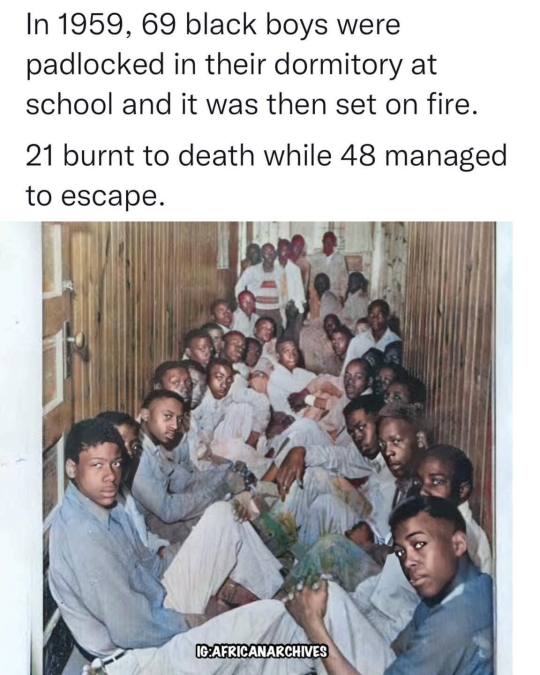
On March 5th, 1959, 69 African American boys, ages 13 to 17, were padlocked in their dormitory for the night at the Negro Boys Industrial School in Wrightsville. Around 4 a.m., a fire mysteriously ignited, forcing the boys to fight and claw their way out of the burning building.
The old, run-down, & low-funded facility, just 15 minutes south of Little Rock, housed 69 teens from ages 13-17. Most were either homeless or incarcerated for petty crimes such as doing pranks. 48 boys managed to escape the fire.
The doors were locked from the outside and fire mysteriously ignited on a cold, wet morning, following earlier thunderstorms in the same area of rural Pulaski County.
The horrific event brought attention to the deplorable conditions in which the boys lived. The boys all slept in a space barely big enough for them to move around & theyre one foot apart from one another & their bathroom was a bucket at the corner where they had to defecate in.
In an ironic twist, the land in which the school stood is now the Arkansas Department of Correction Facility Wrightsville Unit. In 2019 a plaque was finally placed after 60 years.
PURE EVIL!!! MY GOD!!
#white racial hatred#white people are evil#racism#civil rights#history#black history#historical injustice#institutional neglect#fire tragedy#juvenile justice#systemic racism#correctional facilities#commemoration#memorialization#social reform
457 notes
·
View notes
Text
Continuing my Dorley reread and in many ways Dorley is a comedy and one of the most horrifying ways in which Dorley is a comedy is the comedy of watching Steph's idiot self be convinced that she can pull one over on a cult to get transition services from them without herself getting radicalized by said aforementioned cult
#genuinely her lack of self-awareness as she's actively talking herself into being okay with kidnapping is HILARIOUS and also horrifying#theres a lot in here about the inertia of abusive institutions#and how they perpetuate themselves by forcing a lot of otherwise good people to be complicit in them in order to be able to live their live#and how difficult-to-impossible it is to reform that because it's not by a single malicious design so much as a massive pileup of bullshit#and in the case of Dorley it's exaggerated to hell but we've all had to jump through insane hoops at the whims of abusive institutions#in order to get basic fucking healthcare#dorleyposting
49 notes
·
View notes
Text
The church when pastors groom and abuse children: uwu everyone deserves forgiveness
The church when a homeless guy steals because he's literally starving: irredeemable scum. I support the 13th amendment because lowly criminals deserve to be enslaved.
#i say the church as a representation of the racist ableist classist institution#built on weaponizing christianity#a lot of christians are pro prison reform#hypocrisy#christian hypocrisy#ex christian#exvangelical#religious trauma#i don't have a problem with christians#i have a problem with the church as an institution#prison reform#abolish prison#prison abolition#reform the 13th amendment#anti slavery#child abuse
10 notes
·
View notes
Text
the king
when i was doing some research for a historical wilmon fanfic at the royal library’s archive last year i found a short story called the king by martin andersen-nexö from 1914. it was a story of a king who no longer held any power, but was worshipped by his people who didn’t dare to criticize him.
“let him sit!”, the wise men of the country said. “he’s the unsound fantasies of the people, collected in one hand - it’s the cheapest option. and he is our only memory of the slavery of the past. the more he stands out, the more he brings attention to how far we’ve come.”
the king stayed on his throne, but he wasn’t allowed to speak. the people traveled from east and west to see him, and he had to sit nicely on the throne while the people looked at him. meanwhile, the people invented a road of light that would lead talented people to success, no matter their social class. but the king’s throne cast a shadow over the road of light, which paralyzed the entire country.
after some time, the king asked if no one was upset with him. the people didn’t dare to be mad at him, because he sat so nicely on his throne. finally, the king had had enough and his soul left his body, but his body remained sitting. once his soul was gone, nothing stopped him from sitting nicely. he sat there, deaf and blind, until humanity accidentally pushed his throne so that it fell over.
i love this story because in my opinion, it pinpoints some of the reasons as to why i think monarchs - both the real and fictional ones - shouldn’t exist. it’s fascinating how a story published in 1914 so perfectly describes the themes of a tv show from 2021. because this could have been a fabel about wilhelm, who is forced to sit nicely on his throne as tourist attraction and a symbol of the past, which in turn harms not only the people but also wilhelm himself. and if he continues to sit nicely, his soul will eventually leave his body, because it won’t be able to stand it any longer.
#young royals#mine#backstory: this story was published during a time when the socialists and the king were in deep conflict#the socialists wanted to spend money on welfare and the king wanted to spend money on a fancy military boat#the king kicked out the government because of the conflict#it was the last time in swedish history that the king made a political decision#yet this story describes a time more similar to our own#where the king holds no power but is merely an expensive symbol#i feel like this fandom need some anti-monarchy takes because this is not a show that's trying to romanticize monarchism#like wille hates it simon hates it even august is starting to think it's not a vibe#if we're gonna talk about revolutions we're talking burning old institutions to the ground#not trying to reform an institution that is impossible to reform
57 notes
·
View notes
Text
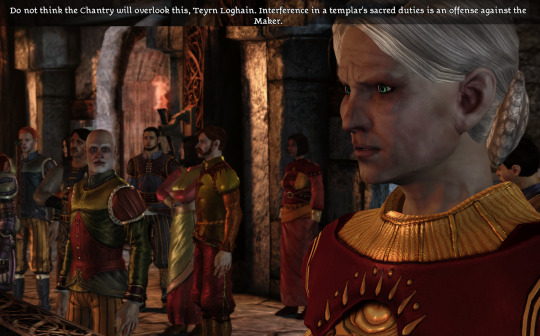
—Was sending an apostate to poison Eamon your duty as well?
obsessed with how fast she turns on him after the alienage quest tells you repeatedly how the templars were turning a blind eye. mother superior knows which way the wind blows. ice cold
#like even the cover story is such a whopper there's no way that was happening under her nose#elthina's fereldan counterpart right she had to be in on it#'tevinter mages offering magical humanitarian aid in the alienage'#there's like. multiple things wrong with every word in that sentence#it's got to be almost as politically objectionable to the chantry as the slave trafficking#but interestingly no one suggests that in itself might help sway the landsmeet#which could imply some things abt the bannorn's priorities vs the chantry's if u felt like overthinking it a lot#delightfully cynical institution. corrupt as all hell :')#can't wait to make hay out of this in my fereldan reformation au
24 notes
·
View notes
Text
It's so crazy to me that people are so resistant to not only completely destroying an institution that can't be salvaged (eg the criminal justice system) but also just to reform when that is much less dramatic. If you say anything in society can be fixed or improved people get on your ass so bad about it. Honestly now that I think about it a lot of these people benefit so much from the status quo that they're incredibly resistant to the idea that their ideal status quo is completely dysfunctional if not outright malicious to so many other people.
#If you say the education system needs reform people get mad and if you say the economic system sucks even if you're not a communist people#get mad.#Which is a bit wild considering the reason those institutions and systems exist is because of mass reforms or revolutions#The current education system literally did not exist until like 200 years ago. Get real#delete later
3 notes
·
View notes
Text
"Don't make a wrong move," the officer said as he pinned the struggling subject to the ground. "Period."
The officer tightened the handcuffs around the subject's thin wrists.
"Ow, ow, ow, it really hurts," the subject exclaimed.
The officer pressed his weight into the subject's small body while school staff watched it all unfold. The person he was restraining was 7 years old.
"If you, my friend, are not acquainted with the juvenile justice system, you will be very shortly," the officer told the child.
Earlier that day, the child allegedly spit at a teacher. Now, he was in handcuffs and a police officer was saying he could end up in jail.
That child — a second grader with autism at a North Carolina school — was ultimately pinned on the floor for 38 minutes, according to body camera video of the incident. At one point, court records say, the officer put his knee in the child's back.
CBS News is not identifying the North Carolina child to protect his privacy.
Similar scenes have played out in viral incidents: police officers arresting young children like him at school, often violently.
In 2018, a 10-year-old with autism was pinned face down and cuffed in Denton, Texas.
Another boy with autism, just 11 years old, was handcuffed and dragged out of school and forced into a sheriff's deputy's car in Colorado in 2021.
And that same year, officers handcuffed and screamed at a 5-year-old who had wandered away from school.
There are many more cases of young children arrested in school — cases that don't make headlines, according to a CBS News analysis of the latest data from the U.S. Department of Education's Office for Civil Rights.
More than 700 children were arrested in U.S. elementary schools during the 2017-2018 school year alone, according to CBS News' analysis.
Experts tell CBS News the fact that young children are arrested at all is troubling.
Ron Applin, chief of police for Atlanta Public Schools, says they've never arrested an elementary school child in his six years running the department.
"I've never seen a situation or a circumstance in my six years where an elementary school student had to be arrested," Applin said. "We've never done it. I don't see where it would happen."
But it does happen elsewhere — and to some kids more than others, CBS News' analysis showed.
Children with documented disabilities were four times more likely to be arrested at school, according to CBS News' analysis of the 2017-2018 Education Department data.
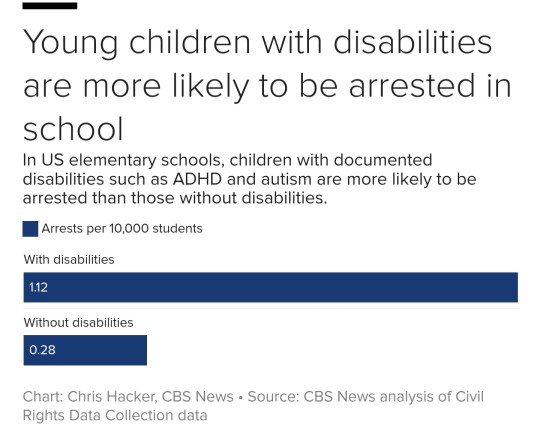
Federal law requires schools to have a plan, known as an Individualized Education Plan (IEP), for dealing with the needs of every student with disabilities.
Those plans help schools understand how to care for children with disabilities, said Alacia Gerardi, the mother of the North Carolina child who was arrested. Without this plan, she said, a police officer might misunderstand her son's behavior.
"I believe a lot of it is a misunderstanding with children who are struggling, that they believe that in general, that behavior indicates intention. And when you're dealing with a child who's going through a difficult time, any child, that is not the case."
Anyone working with children with disabilities must understand how to respond when a child with an emotional or behavioral disorder acts out, according to Dr. Sonya Mathies-Dinizulu, who teaches psychiatry and behavioral neuroscience at the University of Chicago.
In a crisis, children need someone to "be there to help the kid start to de-escalate and help soothe," said Mathies-Dinizulu, who works with children who are exposed to trauma.
Black students are even more disproportionately affected. They made up nearly half of all arrests at elementary schools during the 2017-2018 school year, CBS News' analysis showed. But they accounted for just 15% of the student population in those schools.
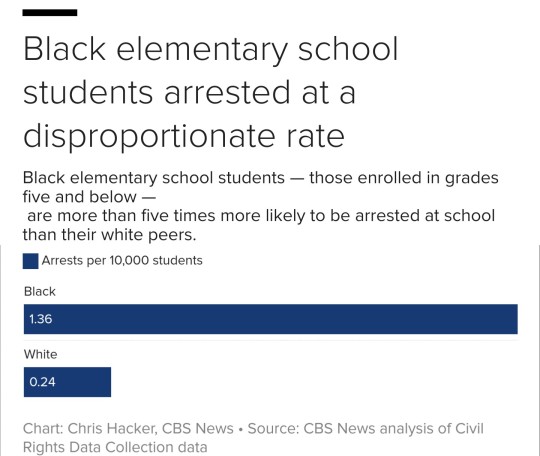
Those disparities could be explained, at least in part, by the mentalities of the officers who work in schools, according to Professor Aaron Kupchik, who teaches sociology and criminal justice at the University of Delaware.
In a 2020 study, Kupchik and his colleagues analyzed interviews with 73 School Resource Officers, or SROs. Nearly all the officers interviewed said their primary mission was to keep the school safe. The difference, Kupchik said, was who those officers felt they needed to protect the school from.
SROs who worked with low-income students and students of color "define the threat as students themselves," Kupchik said. "Whereas the SROs who work in wealthier, whiter school areas define the threat as something external that can happen to the children."
"It's an external threat for the more privileged kids," Kupchik said. "As opposed to students in the schools with more students of color, low-income students, where they're seen as the threats themselves."
One such student arrested was an 11-year-old Black student with disabilities in Riverside County, California. CBS News is referring to him only as "C.B." to protect his privacy.
Police alleged he threw a rock at a staffer, though a police report said she was uninjured. The next day, he was handcuffed after refusing to go to the principal's office over the incident.
A lawsuit filed on C.B.'s behalf alleges his arrest was part of a pattern: police getting involved for "low-level and disability-related behaviors" that could be handled by teachers or administrators.
POLICE HANDLING SCHOOL DISCIPLINE, NOT SCHOOL STAFF
Gerardi said she couldn't understand why her son was handcuffed face down on the floor.
She said school staff called saying her son was having a hard time that day. She later got a text asking her to come pick him up.
What she saw when she arrived shocked her.
"At that point, I had no idea why [he was handcuffed]," she said. "I couldn't fathom in my mind what could possibly have occurred to make handcuffing a 7-year-old face down on the floor necessary."
She said the school staff knew her son had been struggling. He was in a treatment program where he received special support. He had an IEP on file, which documented his needs.
Yet when teachers disciplined her son for repeatedly tapping his pencil — something she said he does out of anxiety — the situation escalated. He spit on a teacher, and the police officer was called. The boy ended up in handcuffs.
"I have a real hard time understanding that these adults don't have a better solution than to do this," she said. "The long-term effects, the trauma of putting a child in a completely powerless situation, even physically over their body and causing them harm based on a behavior is ludicrous to me."
After his mother arrived, the officer allowed her to take him home.
"It was a very rude awakening, because when I arrived there and I picked my son up off the floor, he was limp, completely limp," she said. "He was just exhausted. I didn't know what had happened, but after I saw the video, it was very apparent that his little body just couldn't take being put in that position for that length of time. He had his chest against the floor, his hands behind his back. This man's applying pressure against his back."
Alex Heroy, attorney for Gerardi's family, said the police shouldn't have gotten involved in the first place.
"A lot of officers don't want to be the first line when it comes to a mental health crisis," Heroy said. "They don't have as much training as the teachers in the school, for example, so they shouldn't insert themselves for one, and they really should be there for support."
The officer in that arrest defended his actions.
The officer "knew nothing about [the child] prior to the day in question, including his age or medical history," his attorney said in a statement sent to CBS News.
"Unequivocally, he never intended to cause any harm to [the child] and did the best he could with the knowledge and training he possessed at the time, seeking only to help [the child] and diffuse the situation safely for everyone, including [the child]," the statement said.
The child's school district declined to comment, saying the case had been settled.
The child wasn't charged with a crime, despite what the officer repeatedly said during the incident.
FEDERAL REACTION
Catherine Lhamon, assistant secretary for the Department of Education Office of Civil Rights, said schools should do everything they can to prevent young kids from ending up arrested in school.
CBS News shared the results of its analysis of the Education Department data with Lhamon. Though she said there could be times in which arresting a 7-year-old is acceptable, she said it should not be the norm.
"That should not be the way we expect to treat our students," Lhamon said. "And if you find yourself there as a school community, you should be evaluating hard whether you needed to and what steps you can take to make sure you don't find yourself there again."
When asked if the Department of Education is doing enough to prevent arrests like the North Carolina child's, she said, "You're never doing enough if a child is harmed."
"When we send a child to law enforcement, we are sending a very deleterious governmental message," Lhamon said. "That's scary. I want very much for that to be minimized and for it to take place only in those circumstances where it's absolutely necessary."
Lhamon called the video of the North Carolina child's arrest "enormously distressing" and said it was something she'd never forget.
"There's very little that I saw in that video that is acceptable, and there's very little on that video that is consistent with federal civil rights obligations," she said.
The U.S. Department of Education issued new guidance on school discipline in July, requiring school officials to evaluate a student with disabilities before disciplining them.
Department of Education spokespeople said the agency wants schools to be responsible for the actions of their SROs, even if those officers are employees of a local police department.
"They are responsible for the actions of school resource officers that they employ and that they contract with in their schools, and that the civil rights obligation extends to them," Lhamon said.
Lhamon described the disproportionate impact on children with disabilities and children of color as "deeply distressing."
"It's a deep, deep concern for all of us," Lhamon said. "And it has been over a distressingly long period of time that we see students with disabilities disproportionately referred to law enforcement. We see students of color disproportionately referred to law enforcement."
TRAINING NEEDED
An SRO's training can be critical, according to Applin. He helped change the way Atlanta SROs interact with children.
After being in the top 10 nationally in elementary arrest rates, Georgia changed its approach in 2018. They trained their SROs to focus on helping students to reach graduation, rather than making arrests.
Part of that new SRO training involved "making a switch from being a warrior to a guardian," Applin said.
"One of the things that's stressed to my officers is that we're student focused," Applin said. "The whole idea behind why we're here is to create an environment where students can learn, teachers can teach. We're not here to criminalize our students."
Virginia has taken a different approach. Schools there arrested kids in elementary schools at five times the rate for the U.S. overall during the 2017-2018 school year, according to CBS News' analysis of Education Department data.
Donna Michaelis, who manages the Virginia Center for School and Campus Safety, said Virginia law requires school officials to report any crimes that occur at school — even minor ones like fights, vandalism, or disorderly conduct.
"In that list of criminal offenses, they are very serious things," Michaelis said. "It's not bullying. It is malicious wounding. It is kidnapping. It is threats to harm staff. They are serious crimes: threats to bomb [or] drugs."
Data from the Virginia Department of Education shows that, during the 2020-2021 school year, there were 24 bomb or other threats reported. There were nearly 700 reported threats to either students or staff.
The data doesn't contain any references to "malicious wounding" or kidnapping.
The most common offense in the data is "interference with school operations," which made up nearly 40% of the 14,000 incidents recorded in the data for that one school year.
DO SROS REALLY MAKE KIDS SAFER?
Amid the epidemic of school shootings in the US, many districts have looked to SROs to keep kids safe.
In late 2019, schools in Harford County, Maryland, added three more SROs to its elementary schools. A year later, the Michigan House voted to boost funding for school resource officers in the wake of the Oxford High School shooting that December.
And in 2022, after the Uvalde, Texas, shooting, some Fort Worth city council members argued schools needed more officers to protect kids from future attacks.
But Kupchik's research shows SROs don't make kids safer.
"There is some disagreement [among experts]," Kupchik said. "There have been some studies showing that police officers in schools can prevent some crime and misbehavior, but there are far greater numbers of studies finding the opposite, that they either have no impact or in some cases can increase crime. What they do all show consistently is that while we're not sure about any benefits, there are clear and consistent problems with putting police in schools."
Kupchik said schools with more police have more suspensions and more arrests.
"We see greater numbers of arrests and not necessarily for things like guns or drugs or what we're all afraid of," Kupchik said. "But for more minor things that are unfortunate, but perhaps don't need to result in an arrest record. Something like two kids getting in a fight after school."
Some schools have taken a similar view. Schools across the country, including those in Denver, San Francisco, Fremont, CA, and Chicago have voted to remove SROs.
In the wake of the murder of George Floyd, Minneapolis Public Schools removed SROs from their hallways. The result: a dramatic drop in student referrals to law enforcement, and a shift toward "restorative outcomes" rather than arrests.
Nearly every parent interviewed by CBS News for this story said their children were permanently traumatized by these experiences.
"The trauma from this has truly created PTSD," Gerardi said. "So, day by day, especially if he is physically hurt in any way — even accidentally — it can trigger a real PTSD response that affects the entire family. And, of course, it affects him."
Part of the problem, she said, is that he doesn't understand what happened to him.
"It was an instantaneous 'fight or flight' response, and we were there for literally years," she said. "So to try to calm his nervous system down … has taken a lot a lot of intense work. And it was terrifying. We're going we were going up against a police department, a city, and we live in a small town."
The problems only worsened when her son began running away. The very people she needed to help find him were those who harmed him: the police.
"After you go through something like this, it's hard to have trust that a sane person is going to show up that understands how to deal with a child," she said.
Other parents told CBS News similar stories. The father of one child told CBS News Colorado his child, who was arrested at age 5 and had documented disabilities, "regressed significantly" after the incident and even had to move to a residential treatment facility to receive more intensive care.
Mathies-Dinizulu said those effects can last a child's entire life.
"Children in particular, they could be incredibly resilient," Mathies-Dinizulu said. "But it's something that they will never forget. And because of that, if something traumatic or scary happens to them in the future — that type of accumulated stress from what happened at school, now it's happening again in another place."
The effects of that trauma can warp the way a child sees the world, Mathies-Dinizulu said.
"They may feel like they're not worthy, or they may feel like they're bad," she said. "Some of those symptoms of anxiety or depression or traumatic stress symptoms like flashbacks or anger and irritability might be tied to the traumatic event."
Gerardi said she hopes seeing her son's suffering will help people understand things need to change.
"This is 100% preventable," she said, "100% preventable. There's a lot of trauma and things in life that are not. This is not one of those. This could have been prevented."
#us politics#news#education reform#education system#department of education#school resource officers#SROs#police brutality#stop police brutality#police#police the police#defund the police#acab#2022#cbs news#systemic racism#institutional racism#mental health#mental illness#learning disabilities#Individualized Education Plan#disabilities#discrimination#racism#abelism#Dr. Sonya Mathies-Dinizulu#Professor Aaron Kupchik#Catherine Lhamon#office of civil rights
51 notes
·
View notes
Text
How does one assess the effectiveness of truth and reconciliation processes in addressing war crimes?
Assessing the Effectiveness of Truth and Reconciliation Processes in Addressing War Crimes
Introduction
Truth and reconciliation processes have emerged as important mechanisms for addressing war crimes and human rights abuses in societies recovering from conflict. These processes aim to uncover the truth about past atrocities, provide justice for victims, promote healing and reconciliation, and…
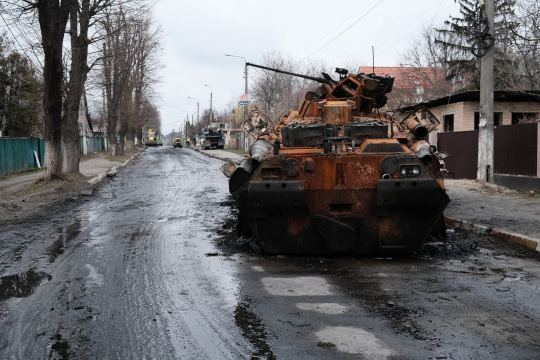
View On WordPress
#Accountability#accountability measures#challenges#contextual factors#cultural context#diverse perspectives#effectiveness assessment#healing#impact on victims#inclusivity#institutional reforms#justice#Limitations#long-term impact#participation#political will#reconciliation#resource constraints#social cohesion#socio-economic context#sustainable peace.#timing#transitional justice#truth#truth and reconciliation processes#truth-seeking#war crimes
0 notes
Text

Salloween Day 7: Prison
#sally face#salloween#spoilers#sally face spoilers#fanart#not to preach in the tags of my fanart but its deeply concerning that some places want to phase out prison visits#tell me your institution isn't about reform but is about dehumanizing without saying it#anyway#batty draws#fan art#drawing#sal fisher#ashley campbell#ash campbell#salloween2023#salloween23#salloween 2023#salloween 23
16 notes
·
View notes
Text
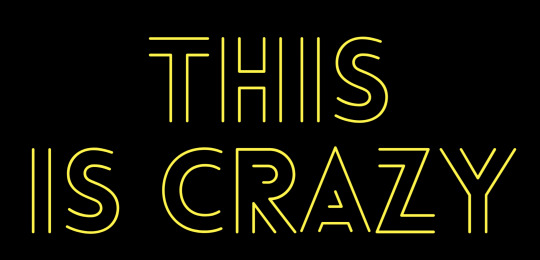
the fix is in!!
#Supreme Court corruption#judicial integrity#legal ethics#accountability#justice system reform#transparency#judicial independence#public trust#legal oversight#ethical standards#judicial misconduct#Supreme Court accountability#judicial power#political thuggery#institutional limits#checks and balances#public pressure#media coverage#judicial reform#democratic principles#constitutional interpretation#judicial impartiality#judicial appointments#separation of powers#government accountability#supreme court ruling#presidential immunity case#Trump legal arguments#congressional impeachment power#criminal charges
141 notes
·
View notes
Text
America would rather implode before admitting its wrongdoings, first and foremost
#in regards to the last reblog abt gazans + reparations#no oppressive entity in power has ever willingly admitted their heinous actions#nor have they willingly provided monetary reparations policy reform institutional radicalization or a simple acknowledgement to parties they#have oppressed#it is an unfortunate truth#dont go twisting words when you should be learning comprehension skills#thanks bye
3 notes
·
View notes
Note
you’re delusional if you don’t think we should abolish what is essentially child labor just because “b-but kids can make friends at school” which they don’t even have time for anymore. School is designed to prepare you for working for a shitty boss and company, not to educate you. Kids should learn basic skills like how to read and write and basic math, but from there it should be their choice on what to learn because they want to, not for a grade.
Tell me you've never spent any time responsible for kids why don't you. This doesn't have shit to do with capitalism. It's about the kids development
#believe it or not#the answer to an institution having issues thanks to outside sociatal influences isn't to abolish it#it's to go back to the actual intentions of that institution and reform with those in eye
2 notes
·
View notes
Text
Apple Adds $25 Million to Racial Equity and Justice Initiative, Increasing Financial Commitment to over $200M since 2020
This week, Apple announced its Racial Equity and Justice Initiative (REJI), a long-term global effort to advance equity and expand opportunities for Black, Hispanic/Latinx, and Indigenous communities, has more than doubled its initial financial commitment to total more than $200 million over the last three years.
Since launching REJI in June 2020, Apple has supported education, economic…

View On WordPress
#Ahmaud Arbery#and criminal justice reform#Anti-Recidivism Coalition#Apple#Breonna Taylor#Defy Ventures#Delgado Community College#economic empowerment#Education#George Floyd#HBCUS#Hispanic-Serving Institutions#Houston Community College#HSIs#Los Angeles Community College District#My Brother’s Keeper Alliance (MBKA)#Obama Foundation#Racial Equity and Justice Initiative (REJI)#The Last Mile#Tim Cook#Vera Institute of Justice
16 notes
·
View notes
Text
Christ the alive the fallout fandom really doesn't pay attention to what the games are actually telling them
#still not as bad as the bioshock fandom but oh my god#people in the notes of that last post all confused b/c they only played fo4 and 'the brotherhood wasnt like that :('#dude fo4 brotherhood was a return to their roots#fo3 had the reformed brotherhood- thats why the outcasts were a thing#fuxking...... it is canon IN FO4#that the bos hates all 'abominations' including but not limited to:#ghouls super mutants synths and anything not 100% human#literally the main difference b/t them and the institute is the bos will use the guns themselves#instead of making their synth slaves do it#FUCK
2 notes
·
View notes